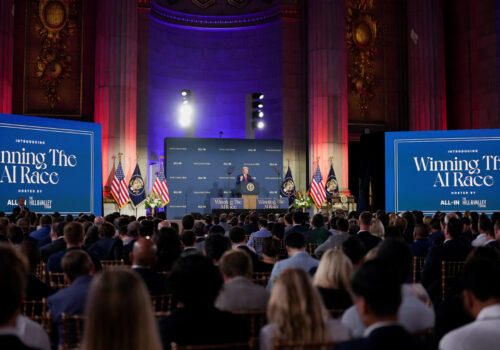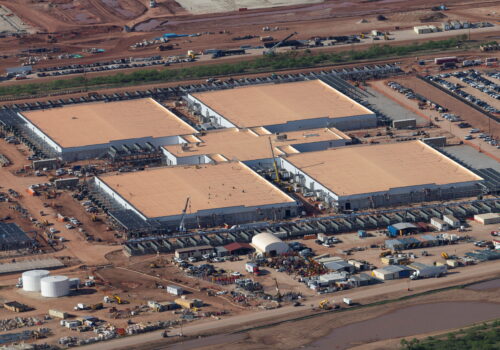It’s time to reckon with the geopolitics of artificial intelligence
The headlines from Donald Trump’s recent meeting with Xi Jinping were all about the US and Chinese presidents reaching a trade truce. But what was lost in the news is a far more significant matter that will shape the high-stakes competition unfolding between the world’s two most significant powers: the contest for the commanding heights of artificial intelligence (AI).
The world has entered the most consequential tech race since the dawn of the nuclear age, but this time the weapons are algorithms instead of atoms. Rather than a race to obtain a single superweapon, this is one to determine how societies think, work, and make decisions. AI is transforming not only the distribution of power around the globe but also the very nature of that power and how it will be exercised.
A race with generational consequences
The Chinese government sees AI as a crucial driver for what it calls “comprehensive national power.” That’s why it is so focused on the rapid integration of AI into surveillance, consumer products and services, advanced manufacturing, military modernization, and even scientific discovery under a unified state strategy. As Tess deBlanc-Knowles, senior director with Atlantic Council Technology Programs, tells me, “One of the notable aspects of China’s approach is the prioritization of application, or what is called ‘AI-plus.’ China has an advantage over the US in terms of providing direction and incentives for the integration of AI across all sectors of the economy.”
When it comes to AI development and deployment, China’s private sector must be subservient to the will of the Communist Party. The cycle of innovation that results is distinct from Western conceptions of more loosely connected relationships among policymakers, industry, and academia.
The United States, by contrast, relies much more heavily on the singular dynamism of its private sector, open research culture, and international alliances. The US government struggles to coordinate its private stakeholders and universities at any national scale. The country remains hamstrung by weakening legal protections for privacy and intellectual property that tend to introduce ambiguity rather than clear running lanes.
And run the United States must. Failure to maintain US leadership on AI could have generational consequences. The outcome of this contest will determine which values—authoritarian efficiency or democratic dynamism—set global norms on everything from digital commerce to autonomous warfare.
“The escalating AI race is drawing comparisons with the Cold War, and the great scientific and technological clashes that characterized it,” write Josh Chin and Raffaele Huang in the Wall Street Journal today. “It is likely to be at least as consequential.” They write that both China and the United States “are driven as much by fear as by hope of progress.”
Helping the US and its allies mobilize, iterate, and deliver
There’s little doubt that who wins this race will depend on who can produce the most advanced chips, the best models, the most potent computers, and the cheapest and most sustainable energy for a proliferation of purposes.
More significantly, the emerging AI contest is about defining the world’s future standards in areas such as freedom, privacy, and even human dignity. The design of the internet—its core protocols and standards—reflected a bias toward openness, self-organization, and free speech that have shaped two generations of lives online and trillions of dollars in consumer technology. This moment in the AI era offers the same pivotal opportunity for influence. If the United States and its allies lose this race, that could produce a world in which AI becomes more of an instrument for political and autocratic control than one for individual and democratic empowerment.
With so much at stake, the Atlantic Council last week launched its GeoTech Commission on Artificial Intelligence as our flagship initiative to address this historic moment. It will bring together congressional leaders, top industry executives, and innovators across the AI ecosystem to ensure that the United States maintains its technological preeminence in an AI-defined world. Our aim is to help the United States and its allies mobilize more stakeholders, iterate faster, and deliver actionable strategies to ensure US and allied leadership—and a more enlightened, prosperous, secure, and democratic future.
The GeoTech Commission, of which I’m a member, will focus on overall competitiveness across six critical realms: AI innovation, supply chains, energy sources, government adoption and oversight, talent development, and international alliances. Rather than prioritizing some of these realms over others, it will integrate these pieces to address what asserting US leadership and winning the AI race should look like. The race for AI doesn’t boil down to one single measure or factor.
Los Alamos this isn’t
I began by writing that the current tech race is the most consequential for humanity since the beginning of the nuclear era. Some have gone further, drawing a direct comparison between the race for AI preeminence and the Manhattan Project that produced the first nuclear weapon. What’s true is that the AI race, like the Manhattan Project before it, will be decided to some extent by scientific breakthroughs. Both also share the potential for great good and catastrophic harm.
Yet this is also a misleading analogy. The Manhattan Project was a clandestine, centralized, US government-led sprint at a time of world war. The US government did have an important role in enabling the AI revolution through the development of technical foundations for deep learning and other advancements. But it has been private industry, not the government, that has leveraged and innovated to get to today’s capabilities.
To win this race, governments know they must work effectively with private companies such as Anthropic, Google, Nvidia, Microsoft, and OpenAI in the United States and Alibaba, DJI, High-Flyer, and Huawei in China. Such companies wield budgets and global reach that would make most defense ministries blush.
‘China is going to win the AI race’
The American edge is in its democratic, free market, innovative ecosystem, which at its best is an unmatched magnet for talent and capital. Yet that ecosystem is also a vulnerability in that Washington can’t control or leverage its tech champions for any overriding national security purpose in the manner Beijing does routinely.
“China is going to win the AI race,” Nvidia CEO Jensen Huang told the Financial Times this past week, pointing to Beijing’s looser regulations, new energy subsidies, and direct intervention to assist its champions. Industry leaders worry that the Trump administration focuses more on restricting what US firms can sell to China than on energetically helping its companies win the race. “We need more optimism,” Huang said a week after Trump announced that he would stop China from gaining access to both Nvidia’s cutting-edge Blackwell chips and a less advanced chip designed explicitly for the Chinese market, and just a few days after the company reached an unprecedented market capitalization of five trillion dollars.
China’s system fuses state and private ambition in a manner that could be decisive, mobilizing government, private capital, and leading-edge science around common cause dictated by Xi and the Communist Party. The system intentionally aligns national goals with corporate incentives. While US companies focus on winning markets, competing with each other, and turning profits, Chinese companies that fail to serve the state and the party do so at their own peril.
In the United States, by contrast, the messiness of the free market could prove an enduring strength in directing capital, talent, and attention to cutting-edge technologies. Winning the race to adopt AI will require newly integrated thinking across the development, use, and consequences of the technology, rather than a narrow focus on how to build more chips or run faster models.
The Atlantic Council’s GeoTech Commission on Artificial Intelligence will grapple with this integrated question and identify how best to counter China’s capacity to leverage its entire society toward technological ends. The Manhattan Project changed history with an explosion. The demonstrations of success won’t be as dramatic with AI, but they will affect every person on the globe. And the outcome may be just as far-reaching in determining what group of countries and which set of values determine the future.
Frederick Kempe is president and chief executive officer of the Atlantic Council. You can follow him on X @FredKempe.
This edition is part of Frederick Kempe’s Inflection Points newsletter, a column of dispatches from a world in transition. To receive this newsletter throughout the week, sign up here.
Further reading
Thu, Aug 7, 2025
Reading between the lines of the dueling US and Chinese AI action plans
New Atlanticist By
Washington and Beijing recently released plans for advancing artificial intelligence. Atlantic Council experts answer six big questions about the two publications.
Wed, Jul 23, 2025
Experts react: What Trump’s new AI Action Plan means for tech, energy, the economy, and more
Experts react By
Our experts unpack how the Trump administration’s AI Action Plan will impact the US tech industry, energy policy, and global AI governance.
Mon, Jul 21, 2025
Navigating the new reality of international AI policy
GeoTech Cues By Evi Fuelle, Courtney Lang
To reach their goals of national AI adoption, governments must continue to advance the global policy discussion on trust, safety, and evaluations.
Image: LAS VEGAS, USA - JANUARY 06: Nvidia CEO Jensen Huang addresses participants at the keynote of CES 2025 in Las Vegas, Nevada, on January 6, 2025. During the presentation, Huang unveiled a range of new chips, software, and services, reinforcing Nvidia’s leadership in artificial intelligence computing and its continued innovation across industries. (Photo by Artur Widak/NurPhoto via Reuters Connect)



